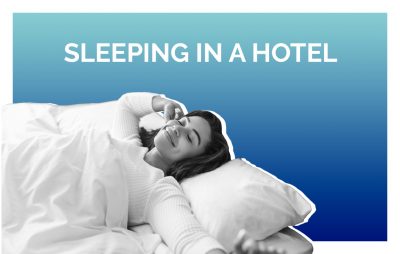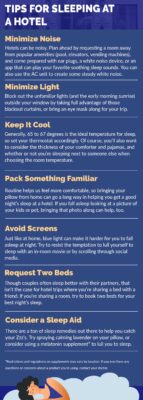
You’re not dreaming — it may feel next to impossible to get a good night’s sleep in a hotel, whether you’re traveling for work or for pleasure. According to a research study, sleep quality can affect a tourists experience. Factor in the potential stress of travel and the disruption that comes with sleeping in an unfamiliar environment, and this reported lack of shut eye actually makes a lot of sense. But there’s no questioning the importance of good sleep, and to help you make the most of your holiday or keep you running on all cylinders for that business trip, we spoke with sleep experts for their tips on sleeping well in a hotel.
Why Is It Hard to Sleep in Hotels?
“New or unfamiliar places can trigger sleep difficulties from environmental issues such as differences in room temperature, noise, scent, type of mattress, and pillow,” says Dr. Carleara Weiss, a member of the American Academy of Sleep Medicine and sleep advisor to Pluto Pillow. That means the unfamiliar odors, the noisy neighbors down the hall, the thermostat that you can’t seem to adjust properly, even the luxurious mattress and bedding can all work against you.
There could also be something evolutionary at play. Annika Carroll, CEO of SleepLikeABoss and women’s sleep and health coach, explains that the brain assesses safety before shutting down to rest. “An unfamiliar place provides uncertainty to the brain, and this often leads to sleep issues in the first one or two nights in that new place.”
These combined factors mean it may be helpful to plan ahead if you’re hoping to get a good night’s sleep at a hotel. Fortunately, a few best practices can go a long way in helping you catch quality zzzz’s in a hotel.
How to Sleep Better in a Hotel
There are a few things you can try to potentially enjoy better sleep in a hotel. First, aim to get ahead of the situation when you book your room. Carroll suggests requesting a room that’s far away from elevators and areas of high foot traffic if possible.
“These quiet rooms tend to be at the end of hallways,” she says. “It might be a bit further to walk to the room, but it’s worth it for the quiet sleep.”
If you’re a repeat visitor, see if you can stay in the same room. “This creates familiarity and will help with better sleep,” says Carroll.
Then, do what you can to manage your sleep environment. Research suggests that the optimal sleep environment is dark, quiet, cool, and comfortable. Here’s how to make that happen when you travel.
Minimize Light
Put those blackout curtains to good use, and set an alarm instead of letting the sun wake you in the morning — while waking up with the sun generally leads to a gentler wake up that works in sync with your circadian rhythm, the last thing you may want to see is the 5 a.m. sunrise after a night of tossing and turning in an unfamiliar hotel. Likewise, keep the room dim in the evening to better prepare for sleep. The Centers for Disease Control and Prevention recommends dimming your room lights two hours before bedtime.
If you have a sleep mask, make sure to pack it. That way, it helps ensure complete darkness even if the room itself has lights you can’t turn off.
Minimize Noise
Hotels can be noisy, even if you have conscientious neighbors. Elevator doors opening and closing, guests walking up and down the hallway, early morning deliveries to the hotel, or ambient street noise can all be incredibly disruptive — and these may not be the kind of things you can reasonably complain about to management. So plan wisely.
“A practical suggestion is using a fan or AC to create white noise and reduce external noise,” says Dr. Weiss. “Most hotels have AC in the room, so take advantage of that to muffle unwanted noise and adjust the temperature according to your comfort level.” Just be sure to spend some time figuring out the AC unit before you go to sleep — some will flick on and off to maintain the temperature throughout the night, so seek out a continuous fan option to keep noise levels steady.
If that doesn’t do the trick, you can use ear plugs, pack a white noise device or even utilize an app with different white noise options.
Keep It Cool
Temperature plays a big role in sleep quality.
“As a reminder, 65 to 67 degrees Fahrenheit is an excellent range for good sleep quality,” says Dr. Weiss, so make a point of setting the thermostat — and yourself — for sleep success. Of course, it’s important to take other factors into account; you might consider the thickness of your comforter, the type of pajamas you’re wearing, or whether or not you’re sharing a bed or room when setting the temperature.
Follow Your Usual Bedtime Routine
Research shows that consistent bedtime routines may be linked to better health outcomes, so stick with that routine as much as possible.
“If you have a sleep routine at home — such as having an evening shower or bath, reading or doing some yoga or journaling, whatever it may be — be consistent on your trip as well,” says Carroll. “Our bodies love routines and so do our minds.”
That includes a consistent bedtime, if possible.
Pack Something Familiar
You may not be able to bring your own bed to your hotel, but you can certainly take your own pillow along. You might even take it one step further by making the hotel room feel more familiar.
“Bring a small item from your bedroom such as a tiny picture frame you might have on your nightstand, your alarm clock or a book you are currently reading,” suggests Carroll. “If you wake up in the night and your brain registers a familiar item, it helps it to feel safe and can assist with sleep.”
Avoid Screens
You’ve heard this before, but screen time before bed may interfere with your quality of sleep and ability to wind down for some shut eye. It’s especially important to unplug when you’re trying to relax somewhere new.
“It’s easy to fall into the temptation of browsing through cable or your phone in a hotel room, but it can harm your sleep quality,” says Dr. Weiss. Blame it on the blue light, which hinders melatonin production.
If you’re using your phone to access a meditation or white noise app, keep the screen lighting low and avoid looking directly at the screen for too long — just enough to navigate to your app and get it started.
Request Two Beds
Traveling with a friend? Request two beds in your room. While research shows that couples sharing a bed may enjoy better sleep, that probably won’t extend to a few nights in a hotel room with a friend. Having a bed to yourself may make it easier to get comfortable for the best chance of good sleep.
Consider a Sleep Aid
If you have a history of sleepless nights in hotel rooms, consider using melatonin to help jumpstart the sleep cycle. Research shows it may be an effective way to improve insomnia in healthy adults; however, it’s important to be mindful when using melatonin, as it is unregulated in the United States and dosage amounts may vary. If you choose to take melatonin, make sure to follow directions carefully.
Minimize COVID-related Travel Anxiety
When you check in, address any COVID-related travel anxiety that might interfere with your sleep. Ask about cleaning procedures and policies in place to protect hotel guests. It might also be helpful to pack your own sanitizing wipes — then you can clean high-traffic spots like door knobs, locks, remotes, light switches, and countertops.
Take our tips on the go with our infographic below!

FAQ s
Why can’t I sleep on vacation?
“New or unfamiliar places can trigger sleep difficulties from environmental issues such as differences in room temperature, noise, scent, type of mattress, and pillow,” says Dr. Carleara Weiss, a member of the American Academy of Sleep Medicine. That means the unfamiliar odors, the noisy neighbors down the hall, the thermostat that you can’t seem to adjust properly, even the luxurious mattress and bedding can all work against you.
Why do I sleep better away from home?
People who struggle to sleep at home may sleep better on vacation because they’re away from stressful triggers or their sleep environment at the hotel promotes good sleep quality.
What to do when you can’t sleep in a hotel?
There are a variety of fixes people who can’t sleep in a hotel can try, including minimizing light and noise, keeping the room cool, and following your typical bedtime routine as much as possible.
The Last Word from Sleepopolis
If you can’t fall asleep in a hotel room, you aren’t alone. Between a possible evolutionary quirk and the unfamiliar environment, there’s a lot working against you. But best practices for sleep, like managing the light, temperature, and noise, plus following a consistent and familiar bedtime routine, could make a big difference. If you happen to love sleeping in a hotel, check out out list of the best hotel mattresses and get one for yourself!



























